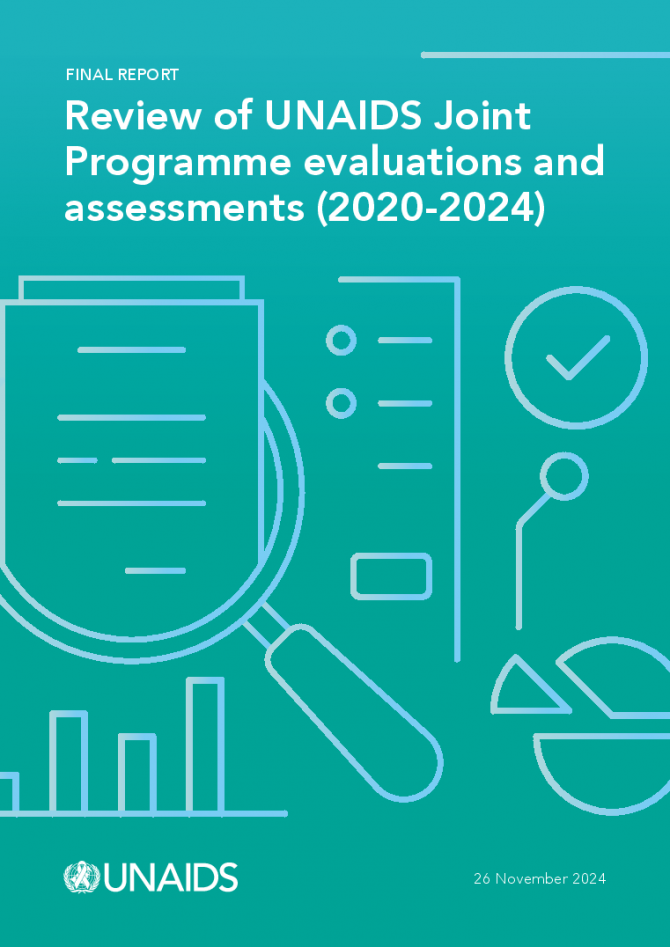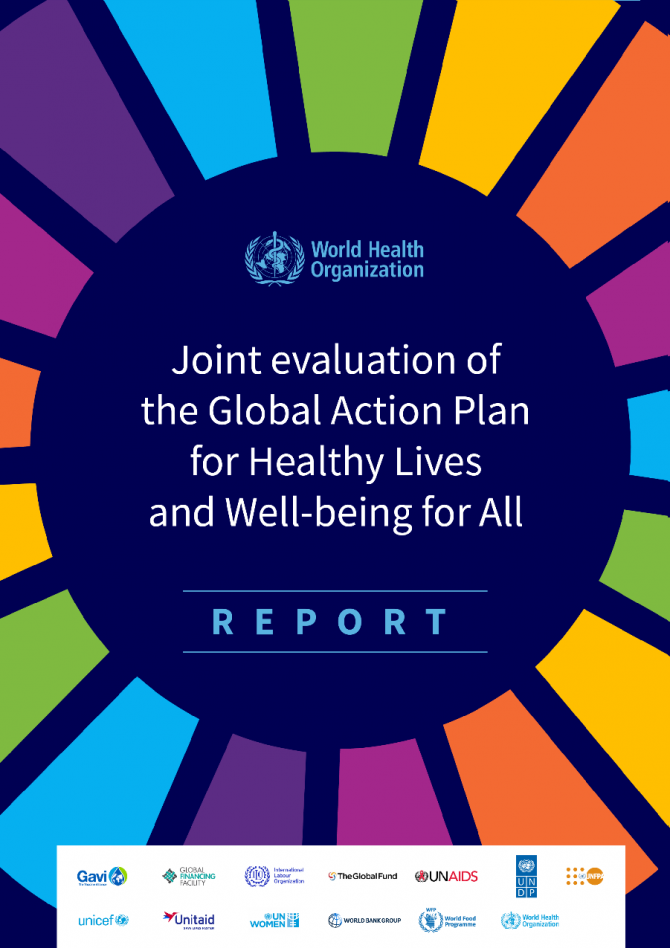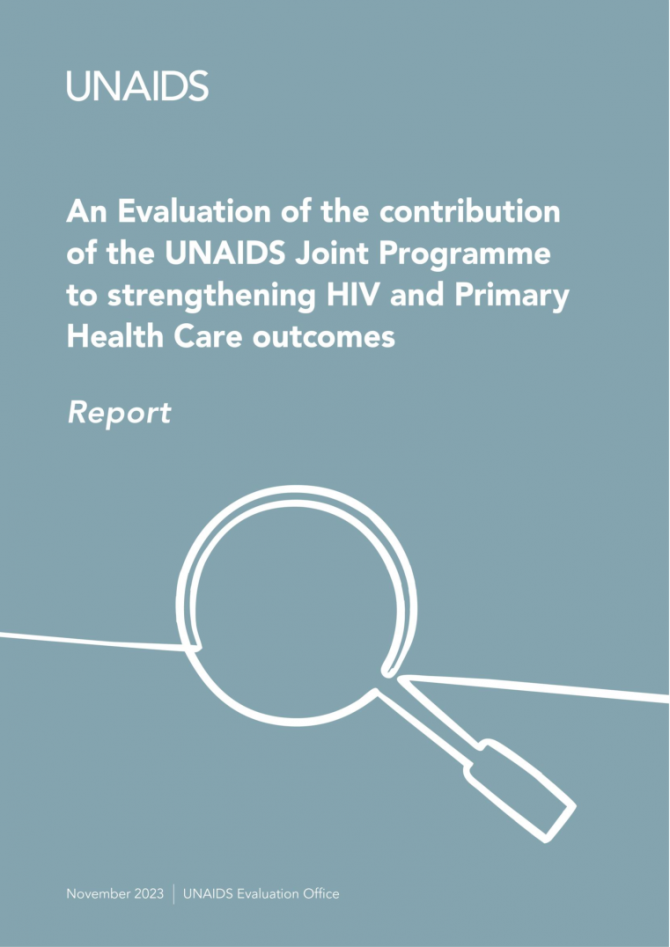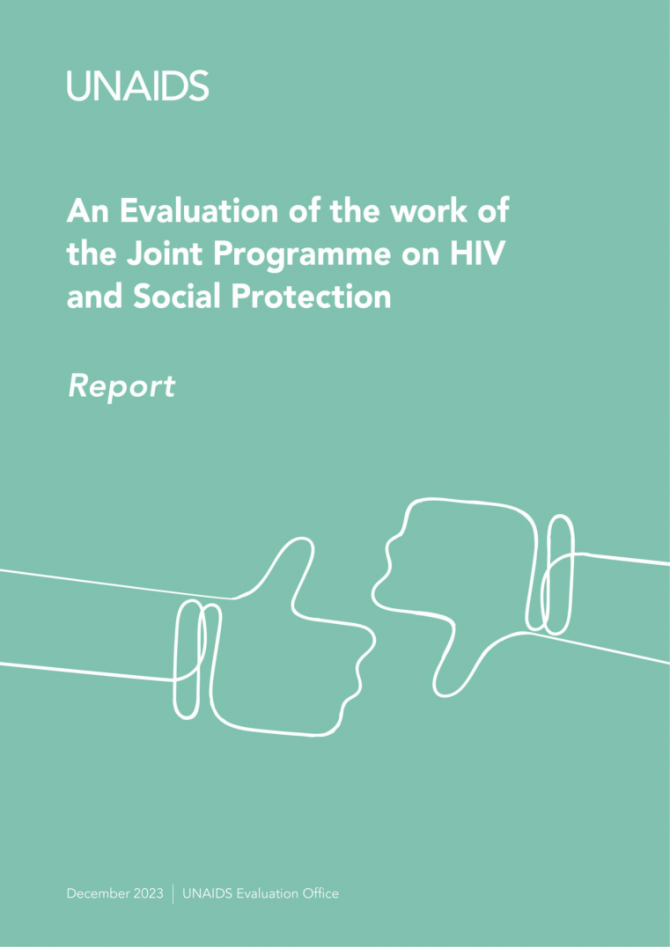
Evaluating UNAIDS' work
UNAIDS’ efforts to bring together national and international partners in a global response to HIV have been successful in many respects. However, HIV remains a global challenge and evaluation is a key element in defining the way forward to achieve the goal of ending AIDS as a public health threat by 2030.
To strengthen accountability, transparency, organizational learning and change, the UNAIDS evaluation function has been strengthened through the establishment of an independent Evaluation Office as a structurally and functionally separate unit of the UNAIDS Secretariat reporting to the Programme Coordinating Board (PCB).
Additional resources have been dedicated to evaluation. Based on the range recommended by the United Nations Joint Inspection Unit (JIU/REP/2014/6), the UNAIDS PCB has established that 1% of UNAIDS’ annual expenditure is to be allocated to the evaluation function. This amount includes staff costs and the cost of evaluations as well as other activities related to the evaluation function.
Every two years, an evaluation plan is developed through a consultative process involving the Cosponsors, the Secretariat and an expert advisory committee on evaluation before being presented to the PCB for approval. The plan includes evaluations to be carried out and activities to strengthen the evaluation culture, stakeholder engagement, professionalization of evaluation and interagency collaboration. An annual progress report on evaluation is presented to the PCB and a semi-annual update is presented to the PCB Bureau.
The scope of the evaluations carried out by the UNAIDS Evaluation Office includes the HIV-related activities of all 11 Cosponsors and the UNAIDS Secretariat, which are carried out together with the evaluation offices of the Cosponsors, as well as UNAIDS Secretariat-specific evaluations. A priority of the UNAIDS Evaluation Office is to promote system-wide and joint evaluations of the response to HIV as part of the 2030 Agenda for Sustainable Development.
Governance reference documents
2024 Annual Report on Evaluation ( En | Fr )
2023 Annual Report on Evaluation and UNAIDS 2024-2025 Evaluation Plan ( En | Fr )
2022 Annual Report on Evaluation ( En | Fr )
2021 Annual Report on Evaluation and UNAIDS 2022-2023 Evaluation Plan ( En | Fr )
2020 Annual Report on Evaluation ( En | Fr )
UNAIDS 2019 Evaluation Policy ( En | Fr )
UNAIDS 2020-2021 Evaluation Plan ( En | Fr )
Expert advisory committee
At its 44th meeting, 25-27 June 2019, the UNAIDS Programme Coordinating Board approved UNAIDS revised evaluation policy [PCB (44) 19.7] which formalizes the establishment of an independent evaluation function reporting directly to the Board. The new institutional architecture includes an advisory committee of evaluation experts, nominated by Member States, civil society and UNAIDS Cosponsors. The committee is an independent, external body which reports to the UNAIDS Board.
The evaluation expert advisory committee advises the Director of Evaluation and the Executive Director on the implementation of UNAIDS evaluation policy and the development and implementation of UNAIDS evaluation plan. Its overall aim is to enhance the use of evaluations, organizational learning and alignment with UNAIDS Strategy, the Unified Budget Results and Accountability Framework as well as UN Evaluation Group norms and standards for evaluation.
The committee has a critical role in providing guidance and advice on the evaluation function and ensuring its independence. The composition of the committee is geographically representative and gender balanced. Members of the committee serve for a term of two years and cannot be reappointed more than once. Currently, the seven members of the committee are:
- Dr Muhammad Bakari, Professor of Internal Medicine, Muhimbili University of Health and Applied Sciences, Tanzania (Africa);
- Dr Sarah Faisal Alawi, Head of AIDS Office, Public Health Administration, Ministry of Health, Kuwait (Asia-Pacific);
- Dr Nikkiah Forbes, Director of the National HIV/AIDS and Infectious Disease Programme, Ministry of Health, The Bahamas (Latin America and Caribbean);
- Mr Theo van de Sande, Expert on open data and OECD/DAC reporting, The Netherlands (Western European and Other Countries);
- Ms Sigrid Vorobjov, Senior Researcher, National Institute for Health Development, Estonia (Eastern Europe);
- Ms Alice M. Kayongo, creative public health advocate with experience building effective community-led initiatives (PCB NGO Delegation);
- Mr Guy Thijs, Director of Evaluation, International Labour Organization (Cosponsor Evaluation Group).
Cosponsor Evaluation Group
The UNAIDS evaluation policy foresees a Cosponsor evaluation group which brings together representatives of the evaluation offices of UNAIDS Cosponsors. A key role of the group, established following consultation with the UN Evaluation Group (UNEG), is to leverage cosponsor capacities and resources on evaluation and share knowledge and experience.
The Cosponsor evaluation group comprises the evaluation offices of UNAIDS 11 Cosponsors and the evaluation office of UNAIDS Secretariat. The aim of the group is to engage in system-wide and joint evaluations related to HIV; provide inputs and resources (e.g. funding, staff-time, best practices) to the design and implementation of evaluations and serve as a reference for HIV-related evaluations.
The group shares information on Cosponsor evaluations related to HIV and provides guidance on mainstreaming HIV in existing evaluations. It also contributes to harmonization of approaches to facilitate analysis of findings of HIV-related evaluations across the UN system. It actively supports the dissemination and use of HIV-related evaluation products.
The Cosponsor evaluation group follows UNEG norms and standards for evaluations that emphasize the independence of the evaluation team, a robust process and methodology, and the usefulness and transparency of findings and recommendations.
The Cosponsor evaluation group contributes to the development of the UNAIDS evaluation plan with a particular focus on system-wide and joint evaluations related to HIV, which can also be part of the corporate evaluation plans of the Cosponsors.
Presentations
Annual report on evaluation (51st PCB, December 2022)
For more information please contact: evaluation[at]unaids.org




